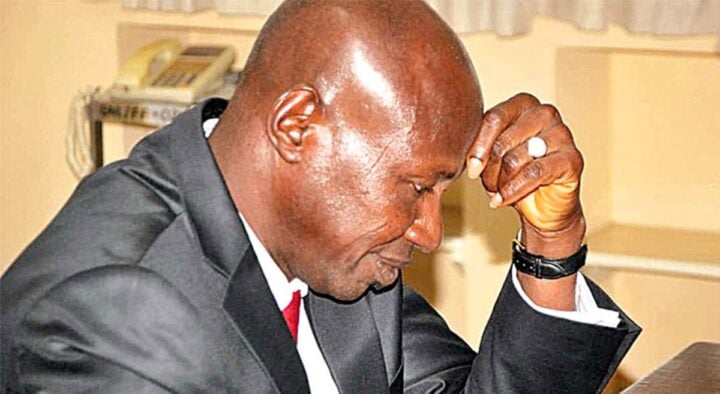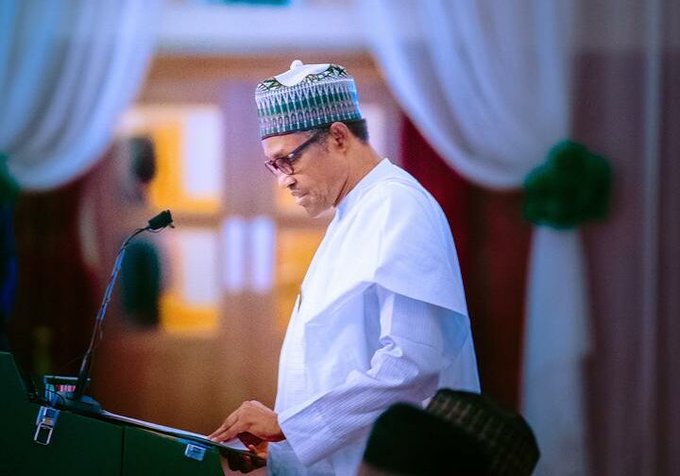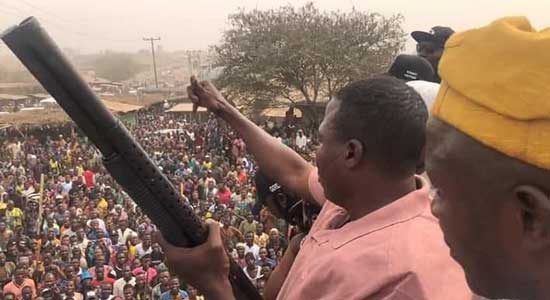The dire incidents of insecurity across the country, have further highlighted, the parlous state of insecurity in Nigeria. In exasperation of the security situation in the state, the governor of Borno state has gone as far as requesting that the armed forces of neighbouring countries be brought in to support the Nigerian Army, as well as the use of private military contractors in the fight against insurgency. The latter recommendation suggests a loss of confidence in the country’s security agencies, who have the mandate of securing the territorial integrity of Nigeria.
The evolution from protests to, especially, the looting of food items during the 2020 ENDSARS protests, further exposed the socio-economic and security vulnerabilities of the Nigerian state. As security is a holistic issue that requires strategic approaches, the policies and strategies designed for securing the Federal Republic of Nigeria therefore, require assessment. Chapter II Section 14(2)(b) of the Nigerian Constitution as amended, declares that the “security and welfare of the people shall be the primary purpose of government”. That Nigeria now ranks third on the Global Terrorism Index, and one of the most fragile countries on the Fragile States Index, is a further demonstration of the appalling security situation in the country.
Given the complex nature of security, especially in contemporary times, responsive and responsible countries normally approach security issues in a strategic manner. This influenced the maiden National Security Strategy of 2014 (NSS 2014) by the Federal Government of Nigeria. The improvement in the security situation after the introduction of the strategy allowed for general elections across all parts of Nigeria in 2015. However, the ever-evolving nature of the national security environment necessitated a review of NSS 2014, leading to the National Security Strategy 2019 (NSS 2019). In Nigeria, the security architecture is the primary responsibility of the President and Commander-in-Chief and is coordinated by the Office of the National Security Adviser (ONSA). The ONSA is responsible for developing the National Security Strategy of Nigeria.
For the NSS 2019, the term security in the words of the NSA “reflects the contemporary paradigm shift away from the state-centric focus of security to one which is comprehensive and emphasizes human security”. The implementation of the NSS 2019 depends on other national strategic documents of the Nigerian government, such as the National Counter-Terrorism Strategy, Cybersecurity Policy and Strategy, the National Defence Policy, and the Economic Recovery and Growth Plan.
Advertisement
What then is human security? The concept first got global attention due to the efforts by Mahbub ul Haq in the United Nations Development Programme’s (UNDP) 1994 Human Development Report (HDR). The 1994 HDR makes a case for the expansion of the scope of security to include threats in the seven areas of Economic security; Food security; Health security; Environmental security; Personal security; Community security; and Political security. As explained in the United Nations General Assembly resolution 66/290, “human security is an approach to assist the Member States in identifying and addressing widespread and cross-cutting challenges to the survival, livelihood, and dignity of their people.”
While not downplaying the need for some traditional hardcore approach of guns and battle in restoring security normalcy in Nigeria, a more sustainable approach will require successful implementation of the human security paradigm, as contained in NSS 2019.
What then does a human security focus entail in praxis for the ONSA? An assessment of the components of human security shows that most of them are on the Concurrent List of the Nigerian constitution, and are therefore issues that the constitution allows both the federal and state tiers of government to be responsible for. This situation will therefore require more strategic engagements by the ONSA at sub-national levels, given that the elements of human security are on the concurrent list.
Advertisement
Most policies and programmes of government are funded by appropriation. The ONSA should therefore start having human security briefings with state governors and state houses of assembly when budget proposals are submitted by state executives, with subtle advocacy on how fiscal policy influences human security and national security.
The rest of this paper will now concentrate on what measures the ONSA should adopt in enhancing human security, different from traditional security measures, in particular – education, health security, economic security, food security, and environmental security.
On education, the ONSA should begin providing advisory on how education spending affects national security. For example, states in Nigeria with a higher number of out-of-school children are also more insecure. Therefore, the ONSA should nudge, apply soft power and advise states on expanding placements for more teachers training at National Colleges of Education (NCEs). Having the highest number of out-of-school children, estimated at 10.5 million surely constitutes a security threat. More precisely, the United Nations Children’s Fund (UNICEF) highlights that 10 states- Bauchi, Niger, Katsina, Kano, Sokoto, Zamfara, Kebbi, Gombe, Adamawa, Taraba and the Federal Capital Territory (FCT), that have eight million out-of-school children.
The policy response by both the federal and state governments towards resolving this challenge of basic education should be of immense interest to the ONSA. As such, there should be more engagements with the Northern Governors Forum in addressing the challenges impeding the full implementation of the Universal Basic Education (UBE) programme, as a way of reducing the burden of 10.5 million out-of-school children.
Advertisement
Efforts in education will dovetail to healthcare and health security. Many states’ government-owned universities do not have Colleges of Medicine, and therefore are institutionally deficient in providing the required number of healthcare professionals. This should be approached from a security perspective, which also compels state governments to make the required investments. Many states have over the years not appropriated and cash-backed the required funds for social investment. Perhaps, highlighting its implications and making both education and health ‘security issues’ of concern by the ONSA, will provide more fillip for government to invest more in these sectors.
With an average life expectancy of 53.95 years, which is below the Sub-Saharan average of 56 years, the World Health Organisation (WHO) ranks Nigeria as having one of the 5th worst healthcare systems in the world. According to the Association of Psychiatrists in Nigeria, there are only 250 psychiatrists in Nigeria, in a country of about 200 million people. The increased cases of insecurity and violence mean that many Nigerians will require psychiatric care. Government budgetary allocation for health in recent years has consistently been below the 15 percent recommended in the African Union’s ‘Abuja Declaration’ of 2001. While the population grows by 3 percent, healthcare funding has been declining. The Basic Health Care Provision Fund (BHCPF) decreased by 13.12 percent from N51.22 billion in 2019 to N44.50 billion in 2020. These and more have led to a staggering 40 percent migration rate of registered doctors.
Perhaps, an assessment of the distribution of medical doctors across the 6 geopolitical zones of Nigeria, when compared to population distribution, will provide some more perspective. The South West has the highest concentration of doctors with 15,018, followed by the South-South with 8,681, and the North Central, 6,861 doctors. The South East has 5,452 doctors, followed by North West with 4,310 and North East 1,638 doctors. From these figures, the north has over 55 percent of the total population has about 30 percent of available doctors in Nigeria. Nigeria’s more populous states have fewer doctors and are also more insecure. The ONSA can work with relevant authorities in developing a health security strategy and implementation plan, that not only highlights how many medical personnel are required in each geopolitical zone annually but also, a pathway to achieving the World Health Organisation recommended doctor-to-patient ratio of 1:1,000. Nigeria’s current doctor-to-patient ratio is 1:2,500. The doctor-to-patient ratio challenge will involve more concern by the ONSA, as it concerns the migration of medical professionals. Here, engagement and policy advocacy, not coercion, is essential. It is not a Ministry of Health problem alone. Let the professionals see the security perspective and work more with the government.
The ONSA should also closely monitor the new innovations in Nigeria’s health insurance scheme, especially the Group Individual and Family Social Health Insurance Programme (GIFSHIP), as a more robust health insurance sector is expected to not only increase health insurance coverage from 4 percent but also improve human security. Implementation of the National Health Act (NHA) should therefore be treated as a security issue. This should be a development-oriented principle, as the President’s Emergency Plan for AIDS Relief (PEPFAR), which is among the most impactful global HIV/AIDS initiatives, sponsored by the US government, has security and foreign policy undertones, not strictly health alone. With 75 percent out-of-pocket spending rate and 4 percent health insurance coverage, the NHA of 2014 which led to the establishment of the Basic Health Care Provision Fund (BHCPF), that in turn, aims to remove financial barriers to accessing primary healthcare, particularly for the poor and the vulnerable, alongside Primary Health Care Under One Roof (PHCUOR), is yet to produce desired outcomes, six years after.
Advertisement
Still on health security, it is a national security risk to have a significant part of Nigeria’s healthcare funding in certain areas, largely provided by international donors. The revert to nationalism for Personal Protective Equipment (PPE) and other supplies at the outbreak of Covid-19, as well as reluctance to quickly share Covid-19 vaccines and withdrawal from multilateral obligations such as the WHO displayed by some current world leaders, demonstrates the vulnerable situation of Nigeria’s healthcare and health security. For example, over $5 billion out of US$6.2 billion spent on HIV treatment in the past 10 years in Nigeria has been from international donors, especially the U.S. President’s Emergency Plan for AIDS Relief (PEPFAR) and Global Fund, for most of the funding for HIV/AIDS, tuberculosis, malaria and the Resilient Systems Strengthening for Health (RSSH). The Global Fund has committed the sum of USD$2.586 billion since 2002 to operations in Nigeria, with $2.436 billion or 94 percent accessed so far.
Primary Health Care (PHC) is the foundation of every good healthcare system. Only 20 percent of the 30,000 PHC facilities across the 774 local governments of the country are in good working condition, which not only reduces access to healthcare for the populace but also puts undue pressure on the secondary and tertiary healthcare institutions. The ONSA should therefore champion advocacy across the tiers of government, for improved healthcare spending.
Advertisement
On the economy, the ONSA should play a more collaborative role in the fight against financial crimes and official corruption. This will ensure that the increased expenditure and appropriation in the social sector are not lost in the procurement process. Prevention is better, given the years and time lost on corruption prosecution. Also, the ONSA should be seen as giving more voice to the activities of migrant herdsmen, whose activities, not only destroy farm produce but lead to losses in agricultural investment, rising food inflation, and food insecurity. With unemployment standing at 27.1 percent or 21.7 million people, and 13.9 million Nigerian youths unemployed, the concerns from the ONSA on the security implications of this high level of unemployment should be more pronounced. The Office should therefore become more inclined towards supporting the activities of the Presidential Enabling Business Environment Council (PEBEC) and the Enabling Business Environment Secretariat (EBES), in promoting a more business-friendly environment for job retention and creation. In particular, the ONSA can take more responsibility in ensuring that the barriers to trade linked directly to different security agencies are removed swiftly – never to return.
On environmental security, some precedence is appropriate. That the incoming US President, Joe Biden nominated John Kerry, a former presidential candidate, Chair of US Senate Foreign Relations Committee and ex-Secretary of State, for the Climate cabinet position, is a pointer to the importance of the environment to national security. Also of note is Biden’s designation of climate change as a national security issue. John Kerry’s position also comes with membership of the United States National Security Council, underscoring the security importance of climate and environmental issues. Such thinking should also be reflected in the activities of the ONSA.
Advertisement
Maintaining a healthy forest cover is a critical part of environmental security. The ONSA should therefore be concerned with the implementation of the National Forest Policy 2020, which is designed to increase the country’s forest area that currently stands at only 6 percent. The National Forest Policy of 2006 had a target of increasing Nigeria’s forest area from 10 percent to 25 percent by 2020 but failed to do so. UN estimates show that nearly 80 percent of Nigeria’s old-growth forests have been lost between 1990 and 2005, which is the highest deforestation rate of natural forests on earth, within the 15 year period. The Office should show more concern in addressing these troubling anomalies. In concluding the discussion on the environment, mention must be made of the need for the ONSA to probably be more involved in the strengthening and monitoring of the activities of the National Agency for the Great Green Wall (NAGGW), established to address the increased cases of desertification, in especially 11 frontline states of Nigeria. Given the international nature of the Great Green Wall project, the ONSA has a role to play in addressing the rising cases of insecurity across the Sahel, due to environmental factors. This concern in forests should also be influenced by the mismanagement of the Sambisa forest, which has become a staging post for terrorists.
For federal character, the NSS 2019 recognizes the management of diversity is essential. The major consensus on the current administration is that there has been poor management of Nigeria’s diversity. Diversity management is essential for not only governments but also for businesses. This is as diversity management has become one of the standard modules in Masters of Business Administration and other academic programmes, signifying its importance in a globalized world. In the NSS 2019, separatism was mentioned in relation to only the southeast geopolitical zone. Well, such calls are now being heard in other zones, such as the South West of Nigeria. What this means is that adherence to federal character principles by the government should increasingly be advocated as a security principle by the ONSA.
Advertisement
Federal and state governments usually submit appropriation bills to parliament in the last quarter of each preceding year. The ONSA can publish the advisory on how such budgetary estimates affect human and national security strategy and projections. It is hoped that such ‘advocacy’ can influence parliaments across federal and state levels to pass laws that will enhance human and national security. This approach does not preclude private consultations with the executive arms of government prior to appropriation bill considerations by parliament. The National Economic Council meetings and Nigeria Governors Forum meetings, that have the governors of the 36 states of the federation as members, can also provide an efficient avenue for these sub-national engagements and consultations.
With complaints and opinions about the ‘suffocating and somewhat inefficient’ capacity of the federal government on many issues, this is not in any way, a suggestion for an expansion of federal powers or responsibilities. Rather, it recommends a new perspective and approach by ONSA in attaining the goals of the NSS 2019.
A nation that is literally at war and very fragile requires increased tempo, and maybe visibility from the national security apparatchik. The humanitarian crisis that will occur, and has been occurring with the rise of Internally Displaced Persons (IDP) camps across the country can lead to total state failure in the near future, if not strategically handled. The NSS of the Federal Republic of Nigeria 2019 should be updated to also reflect current realities, while the ONSA should be more involved in national and state governance, for better human security. Rising and persistent complaints about poor diversity management and lack of federal character principles should also be of increased concern to the NSA.
The human and national security of Africa’s largest economy and most populous country is essential for Africa and the world.
Chukwuemeka Uwanaka is a policy analyst. You can reach him via [email protected].
Views expressed by contributors are strictly personal and not of TheCable.
Add a comment







